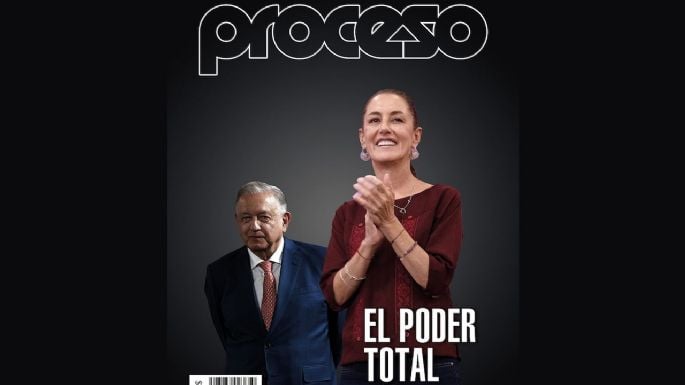Claudia Sheinbaum’s epic electoral victory would not have been possible without AMLO’s enduring — indeed, ripening — popularity. The question is: what will she do with her newfound power after the hand over on Oct. 1?
The word “historic” tends to slip too easily into newspaper headlines in post election analysis, but in the case of Mexico’s elections this past weekend, history was most definitely made — on a number of fronts. For the first time in over 200 years of (relative) national independence, Mexico has its first female president. As the Washington Post reported with time-honoured sensitivity, “Mexico is famous for its macho culture,” yet it “has just elected its first female president, Claudia Sheinbaum, in what was essentially a race between two women engineers.”
The Post contrasts this landmark achievement in Mexico with the “two-man contest” about to take place in the US between Biden and Trump, while predictably ignoring Robert Kennedy Junior’s independent candidacy in the presidential race. It correctly points out that Mexico is “eclipsing its northern neighbour on gender parity in governance”, and not just in the highest office: “women hold half the seats in Mexico’s legislature — roughly double the percentage in the U.S. Congress” — and there is a larger share of female governors than in the US.
Electoral Bloodbath
The elections were historic for another reason: the sheer scale of the bloodbath. According to projections made by the National Electoral Institute, or INE, the 61-year-old former Mexico City mayor garnered around 58-60% of votes. That is around 30 percentage points more than her conservative rival, Xóchitl Gálvez, and some 50 percentage points ahead of the only man in the race, centrist candidate Jorge Alvarez Maynez. It is also six percentage points more than Mexico’s outgoing President Andres Manuel López Obrador’s vote haul in 2018 (53.2%) and according to El País, the highest vote count of any presidential candidate in recent history.
Support for Mexico’s traditional parties, the National Action Party (PAN), the Institutional Revolutionary Party (PRI) and the Party of the Democratic Revolution (PRD), which in Gálvez fielded a unified candidate who was uniquely unqualified to govern, once again crumbled, both at the national and state level. Sheinbaum’s ruling MORENA party also benefited from a mass exodus into its ranks of PRI governors, senators and representatives, some, unfortunately, with long histories of corruption.
Sheinbaum’s crushing victory would not have been possible without López Obrador’s enduring — indeed, ripening — popularity. As the US pollster Gallup reported just days before the election, López Obrador (aka AMLO) is ending his six-year term with record high approval ratings of 80%, making him one of the world’s most popular national leaders. It puts to shame his presidential counterparts in North America. After less than four years in office, Joe Biden is the least popular US president in 75 years, according to Newsweek, while Trudeau’s approval ratings consistently hover at or below 40%.
In 2023, confidence in the national government was twice as high in Mexico as it was in the U.S. (30%). What’s more, public approval of, and confidence in, the government actually grew over time, as opposed to steadily or rapidly declining. When was the last time that happened in your country?
As millions in Mexico head to the polls on Sunday to choose President Andres Manuel Lopez Obrador’s successor, he ends his term with record high approval ratings (80%).
This rating makes him one of the most well-liked leaders in the world.
When Obrador came to power in December… pic.twitter.com/An5t3D9zGf
— Gallup (@Gallup) May 30, 2024
First Jewish President
Sheinbaum is not just Mexico’s first female president; she is also its first Jewish president — no mean feat in a country with one of the largest Catholic populations and whose Jewish community represents just 0.03% of the populace. A daughter of a Sephardic mother and an Ashkenazi father who were both active in left-wing movements in the 60’s, Sheinbaum is not a practising Jew. During the campaign she described herself as “non-religious.”
Like her parents, Sheinbaum’s background was in academia before entering politics in the late ’90s. Per Wikipedia:
“(She) studied physics at the National Autonomous University of Mexico (UNAM), where she earned an undergraduate degree in 1989. She earned a master’s degree in 1994 and a Ph.D. in 1995 in energy engineering…
In 1995, she joined the faculty at the Institute of Engineering at the National Autonomous University of Mexico (UNAM). She was a researcher at the Institute of Engineering and is a member of both the Sistema Nacional de Investigadores and the Mexican Academy of Sciences. In 1999, she received the prize for best UNAM young researcher in engineering and technological innovation…
In 2007, she joined the Intergovernmental Panel on Climate Change (IPCC) at the United Nations in the field of energy and industry, as a contributing writer on the topic “Mitigation of Climate Change” for the IPCC Fourth Assessment Report.
A Sheinbaum presidency is unlikely to result in a substantial shift in Mexico’s stance toward Isreal and Palestine. The North American nation has maintained ties with both Israel and Palestine for decades and has consistently held a fairly neutral position on the Middle Eastern conflict regardless of the ruling political party.
“If we take sides we would not help to bring about what should matter most to all of us: that the war stops, that there are no more deaths, dead, murdered in Gaza,” said AMLO last week. “That is why we have acted very cautiously.”
AMLO has repeatedly condemned the violence in Gaza and called for a ceasefire, though he has so far refused to call Israel’s onslaught of the enclave as “genocide”. But unlike many of his peers in Latin America, his government does not recognise Palestine as a state, though it did reclassify the Palestinian Authority’s diplomatic mission in Mexico City last year from special delegation to embassy. Last week, just days before the election, it requested to join the genocide case filed by South Africa against Israel.
Sheinbaum, like AMLO, has condemned Israel’s systematic attacks against civilians. She has also called for a cease-fire and reiterated her support for a two-state solution. During Israel’s bombardment of the Gaza Strip in 2009, she wrote a letter to the Mexican daily La Jornada condemning what she described as “the murder of Palestinians”:
My maternal grandparents came to Mexico fleeing Nazi persecution. They were saved by a miracle. Many of my relatives from that generation were exterminated in the concentration camps. Both families decided to make Mexico their homeland. I was raised as a Mexican. Loving its history and its people. I am Mexican and that is why I fight for my country. I cannot and do not want to deny my history; to do so would be, as León Gieco says, to deny the soul of life. But I am also a citizen of the world, because of my history and because that is how I think it should be…
Therefore, because of my Jewish origin, because of my love for Mexico and because I feel like a citizen of the world, I share with millions the desire for justice, equality, fraternity and peace, and therefore, I can only see with horror the images of the State bombings… No reason justifies the murder of Palestinian civilians… Nothing, nothing, nothing, can justify the murder of a child. For this reason, I join the cry of millions around the world who are calling for a ceasefire and the immediate withdrawal of Israeli troops from Palestinian territory.
“Total Power”
Following these elections, Sheinbaum’s ruling MORENA party and its coalition partners will have sizeable majorities in both of Mexico’s legislative houses and possibly even “super majorities” — i.e. more than two-thirds of the seats. This, as the Atlantic Council notes, “allows for constitutional changes which could not be obtained thus far by the López Obrador administration.” The MORENA coalition also won at least six of the eight gubernatorial seats up for grabs, as well as Mexico City’s all-important mayoral race. As a result, it will control at least 23 of Mexico’s 32 states. From Jacobin‘s Kurt Hackbarth:
According to (INE’s) conteo rápido, or fast count, the landslide was expected to carry over into Congress as well, with MORENA and its allies winning up to 380 of 500 seats in the lower house, the Chamber of Deputies, and up to 88 of 128 seats in the Senate. This would put the center-left coalition within range of its ambitious goal of achieving a qualified majority of two-thirds, which would allow it to pass constitutional reforms on its own (together with the state legislatures it controls). And not only did MORENA win the all-important mayorship of Mexico City with candidate Clara Brugada, the MORENA coalition is also set to pick up at least six of the eight governor’s races up for grabs…
In 2018, the conservative parties Institutional Revolutionary Party (PRI) and National Action Party (PAN) ran separately; this year, they ran in coalition. But instead of adding in numbers, the coalition wound up subtracting.
The front page of the news magazine, Proceso, sums it up nicely: “Total Power”. Of course, as Lord Acton once warned, too much power can be a dangerous thing, even for a political project that commands the widespread support of the public. There is a concern, not only among MORENA’s opponents, that without any meaningful counterweights or balances, the party could end up taking greater control of the federal system and even recreating the one-party system that governed the country for roughly 70 years.

A History of Outside Meddling
That said, Mexico’s government will always face opposition and interference from beyond its borders. In fact, MORENA’s electoral triumph has occurred despite a coordinated international campaign between the US Drug Enforcement Agency, Western think tanks and media to paint AMLO and MORENA as being in league with Mexico’s drug cartels. During the presidential debates, the conservative candidate, Xóchitl Galvez, repeatedly called Sheinbaum a “narco candidate,” to no avail.
As I noted in February, the accusations were unsubstantiated and their main source was a DEA informant who had earned a reputation for fabricating testimonies. The “exposé,” published simultaneously by two US publications and a German broadcaster, came just eight months after the Mexican government locked horns with the DEA over revelations that the agency had run a covert, 18-month incursion into Mexican territory, in direct contravention of Mexico’s 2020 National Security Law. In the end, these attempts by the DEA and international media to hijack the political debate ended up backfiring, as I warned could happen:
Most of Mexico’s corporate press will happily lap up and amplify any allegations against AMLO or Sheinbaum, whether demonstrably true or false. That said, it is unlikely that these allegations will have any material impact on Mexico’s elections and could end up backfiring. My guess is that those who already despise AMLO will despise him a little more while those who support him will continue to do so, just more fervently. In other words, it will help to fuel political polarisation in the country while increasing distrust of the DEA among AMLO supporters, who continue to represent over 60% of voters.
In fact, AMLO, now in his last year in office, is the second most popular national leader in the world after India’s Prime Minister Narendi Modi. I would argue that the main reason for this is that Mexico’s economy has fared far better than AMLO’s doomsaying detractors have consistently predicted over the past five years. In the IMF’s latest nominal GDP forecasts, in December 2023, Mexico placed 12th in the ranking of the world’s largest economies, having overtaken Spain, Australia and South Korea in the past two years.
Given the economic sweet spot Mexico finds itself in right now, with unemployment at its lowest level in 20 years and investment pouring into the country from companies looking to take advantage of the nearshoring trend, all Sheinbaum had to do on the campaign trail was pledge to continue where AMLO left off while refusing to be goaded by the opposition’s “go-negative” campaign. Which is pretty much what she did.
Hackbarth documents, her 100-point program includes “extending social programs and scholarships, continuing annual minimum-wage increases, consolidating Mexico’s push toward national health care, building a million affordable homes on a rent-to-buy plan, constructing seven long-distance train lines, mandating that companies investing in the “nearshoring” phenomenon provide higher wages and benefits, and — in what is certain to continue raising the hackles of multinational energy interests — a public sector–led energy transition building on Mexico’s state-owned oil, electricity, and lithium companies.”
The hackles have been raised throughout AMLO’s five-and-a-half-year mandate, with Western media, NGOs and think tanks relentlessly trying to depict AMLO as a threat to both Mexico’s economy and democratic system. In 2018, the Financial Times‘ Latin American editor, John Paul Rathbone, described him as a bigger threat to liberal democracy than Brazil’s strongman president Bolsonaro.
When AMLO and Bolsonaro were elected, the FT’s Latin America editor wrote that the democratic socialist posed a bigger threat to ‘liberal democracy’ than the fascist.
AMLO leaves office with 80% approval ratings.
Bolsonaro is now being investigated for planning a military coup. pic.twitter.com/k30NED9pk5
— Matt Kennard (@kennardmatt) June 3, 2024
Contrast The Economist‘s depiction of AMLO with Time magazine’s near-messianic treatment of his predecessor Enrique Peña Nieto, whose PRI government would end up being one of the most corrupt of modern times. (Peña Nieto, like two other former presidents of Mexico, Carlos Salinas de Gotari and Felipe Calderon, is now a full-time resident of Spain).
In 2022, the Index on Corruption, a London-based NGO that has been around since the Cold War and which bashfully describes itself as “the global voice of free expression,” even named him as “tyrant of the year.” As we reported at the time, the NGO’s donors include the Charles Koch Foundation, George Soros’ Open Society Foundations, Google, Facebook, the European Commission and the National Endowment for Democracy (NED).
The irony was palpable: a non-profit whose stated mission is to defend free expression and combat censorship worldwide accepting funding not only from three of the companies that, partly at the behest of certain governments, did more than just about any other to censor online information and debate in 2022 but also NED, which has spent the past 40 years trying to pull off soft coups and colour revolutions in Latin America, Asia and Eastern Europe.
Looking Ahead
Lastly, a few brief thoughts on the challenges, opportunities and possible betrayals that may lie ahead. One very obvious difference between Sheinbaum and AMLO is their leadership style. AMLO is a stay-at-home president who has left Mexico to attend overseas events and engagements on probably fewer than ten occasions since taking office in late 2018. To his credit, he has not once attended the World Economic Forum’s annual meeting in Davos. His focus has been squarely on the domestic agenda, and there are few national leaders on the global stage who have done such a good job at dominating national politics.
One of the main keys to AMLO’s success is the hours-long morning press conferences, or “mañaneras”, that he has chaired at the National Palace more or less everyday from Monday to Friday since the beginning of his presidency. This has enabled him to communicate directly with the Mexican people, cutting out the middlemen and women in the broadly hostile domestic and international media and nipping in the bud many crises before they bloom. It has allowed him to control most of the key narratives at a time when most Western governments are rapidly losing control of the narrative and having to resort to ever more blatant forms of censorship.
In this particular area, Sheinbaum will not be able to fill AMLO’s shoes though she is determined to keep direct lines of communication with the Mexican public open. As she herself admitted in an interview with the Russian journalist Inna Afinogenova a few months ago, “(AMLO) has an extraordinary form of communication that is recognised by locals and foreigners alike” as well as an encyclopedic knowledge of Mexican history, culture and geography, “so we have to adapt something special to our personality, but there must continue to be this awareness of the people of Mexico and this direct communication.”
There are certainly areas where Sheinbaum could improve on AMLO’s performance, including the environment (a subject on which she is an expert), women’s rights, and security, an area in which she has already excelled. As mayor of Mexico City (2018-23) she was able to reduce intentional homicides in the capital by half. Since 2019 Mexico City has accounted for almost a quarter of all high-profile arrests in the country. And unlike many other parts of the country, most of those arrests were carried out by local police — and not the army or national guard.
Sheinbaum attributes much of this success to her administration’s extensive use of data and surveillance technologies to tackle serious crime. As Biometric Update reports, over the last decade “Mexico City has installed the largest video surveillance system in the Americas, altering the way criminal investigations are conducted for better or worse.”
This highlights another key difference between AMLO and his successor: whereas AMLO is very much an old school Mexican politician with nationalist sensibilities, Sheinbaum appears to be more of a technocrat with globalist leanings. Before entering politics, she received a grant from the Rockefeller Foundation, one of the world’s longest-standing proponents of technocracy. During her time as mayor of Mexico City, her administration also received funding from George Soros’ Open Society Foundation and Bloomberg Philanthropies.
In January, Todd Martinez, director of the sovereign debt group at Fitch Ratings, remarked in a seminar broadcast to investors that while “Sheinbaum does come from the left-wing Morena party, she seems like more of a technocratic figure.” And technocrats can apparently be trusted — at least by the investor class. Interestingly, the word “technocratic,” denoting a system of governance based on technical approaches, is often used pejoratively by AMLO to refer to the ultra-neoliberal administrations that preceded him.
This invites the question: to what extent will Sheinbaum, a committed environmentalist with apparent globalist leanings who is determined to move ahead with the energy transition, stay true to AMLO’s political project, which is largely based on principles of energy (mainly oil) and food independence and security? Will she be another Lenin Moreno, the Ecuadorian president hand-picked by his predecessor, Rafael Correa, to continue the country’s economic development along largely left-wing lines, who, once elected, handed in Julian Assange to British authorities in return for an IMF loan? Or will she stay loyal to her long-time mentor?
For the moment, there is no way of knowing. Something else that is not yet clear is who she will have to deal with in Washington after the November elections. If Trump wins, as is widely expected despite his legal entanglements, will he follow through on his plans to covertly send “kill teams” into Mexico to take out cartel kingpins? Even if he doesn’t win, relations between the US and Mexico are likely to remain fraught, especially if the US, as the Council of Foreign Relations’ Shannon K. O’Neil suggests, seeks “to boost economic ties with Mexico by enforcing free trade rules and insisting on the fair and equal treatment of businesses.”








